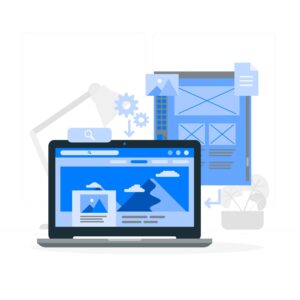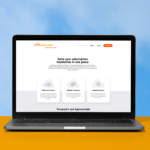10 Reasons Why Your Business Needs a Website in 2023
- February 5, 2023
- 11 min read
- Digital, Web Design

A website for your business is more important than ever in today’s digital age. A website serves as your company’s online presence, and it is where potential customers can learn more about you, your products and services, and your brand. If you’re still debating whether your company needs a website, here are 10 compelling reasons why you should invest in one in 2023.
Number #1: Increased Visibility and Reach
Having a website gives your business a larger, more visible online presence. A website can be viewed by anyone, anywhere, at any time, which means you can reach a much larger audience than you would through traditional advertising methods. Even if you don’t actively engage in other forms of online marketing, this increased visibility can help you attract new customers and build your brand. You can reach potential customers from all over the world by having a website, rather than just those in your immediate area. This is especially useful for companies that sell products or services that can be easily shipped or delivered online.
Number #2: Credibility and Trust
Credibility and trust are two critical factors that can have a significant impact on your company’s success. A professional-looking website can help establish your company as credible and trustworthy, increasing customer confidence and allowing you to build strong, long-lasting relationships with your customers. Furthermore, having a secure website that protects sensitive information, such as customer data, with encryption technology can help build trust with potential customers. This demonstrates that you value your customers’ privacy and security, which can be a major factor in establishing trust and credibility with them.
Number #3: Cost-effective Marketing
A key advantage of having a website for your business is cost-effective marketing. A website is one of the most cost-effective ways to reach a large audience and promote your products or services in today’s digital age. Here are some of the reasons:
- Low cost of setup and maintenance: Creating and maintaining a website can be far less expensive than traditional forms of marketing and advertising, such as print ads or television commercials.
- Ability to reach a large audience: A website allows you to reach a large audience, both locally and globally, without incurring the high costs associated with traditional forms of advertising. This allows you to save money while reaching a large and diverse audience.
- Affordable online advertising options: Online advertising options such as pay-per-click advertising or social media advertising can be much less expensive than traditional forms of advertising. These options enable you to target specific demographics and geographic areas, allowing you to reach your target audience more effectively and at a lower cost.
- Increased customer engagement: A website gives customers an interactive platform to learn about your products or services, ask questions, and provide feedback. This increased engagement can assist you in developing stronger relationships with your customers and increasing customer loyalty, both of which can lead to repeat business and word-of-mouth referrals.
- Measurable results: Unlike traditional forms of advertising, a website allows you to track and measure the outcomes of your marketing efforts. This allows you to see what’s working and what isn’t, and make adjustments as needed to ensure that your marketing efforts are getting the most out of them.

Number #4: Improved Customer Service
Another significant advantage of having a website for your company is improved customer service. A website allows you to connect with customers, address their concerns, and provide the information and resources they need to make informed decisions. Here are some ways a website can help you improve your customer service:
- Easy access to information: A website provides customers with an easy-to-use platform for accessing information about your products or services, as well as contact information and customer support resources. This can help reduce the time and effort customers expend searching for the information they require, as well as improve their overall experience with your company.
- Increased customer engagement: A website gives customers an interactive platform to ask questions, provide feedback, and learn about your products or services. This increased engagement can help you strengthen your customer relationships and increase customer loyalty.
- Improved communication: A website provides a simple platform for customers to communicate with your company via contact forms, live chat, or email. This improved communication can help you respond to customer questions and concerns more quickly and effectively, leading to increased customer satisfaction and loyalty.
- Online resources: A website can also offer customers online resources such as FAQs, how-to guides, and product demos to help them better understand your products or services and make informed decisions.
Number #5: Ability to Collect Customer Data
The ability to collect customer data is a significant benefit of having a website for your company. Customer data is a valuable resource for understanding your customers’ needs, preferences, and behaviour and using this information to improve your products, services, and marketing efforts. Here are a few ways a website can assist you in collecting customer data:
- Contact forms and surveys: A website allows customers to provide you with information via contact forms and surveys. This data can include basic contact information like name and email address, as well as more detailed information like customer preferences and feedback.
- Analytics: A website allows you to track and analyse customer behaviour, such as page views, time spent on the site, and conversion rates. This data can help you understand how customers use your website, what works and what doesn’t, and make changes to your site as needed.
- E-commerce data: If your company sells products or services online, a website can provide valuable information about customer purchases, such as which products are purchased, how frequently, and by whom. This data can assist you in making educated decisions about your product offerings and marketing efforts.
- Data from social media: If your company has a presence on social media, a website can assist you in collecting data from these platforms, such as likes, shares, and comments. This data can help you understand how customers interact with your brand and what they value the most about your products or services.
Number #6: E-commerce Capabilities
E-commerce capabilities are a critical benefit of having a website for your business, particularly in the digital age when online shopping has become the norm for many consumers. A website allows you to sell your products or services to customers directly, reach a larger audience, and expand your business without the constraints of a physical location. Here are a few ways that a website can help you take advantage of e-commerce capabilities:
- Online Store: A website gives you the opportunity to create an online store where customers can easily browse your products or services, add items to their cart, and complete the checkout process. Customers can easily purchase from you regardless of their location, which can help increase your sales and reach.
- Payment processing: A website provides a platform for you to securely process online payments, including credit cards, PayPal, and others. This makes it simple for customers to pay for their purchases and allows you to receive payment more quickly and securely.
- Inventory Management: A website can assist you in more effectively managing your inventory by providing real-time stock level updates and automatically updating your online store as your inventory changes. This can help you avoid overselling, ensure that customers have access to the products they require, and make managing your business easier.
- Marketing and promotion: A website allows you to market and promote your products or services by utilising a variety of digital marketing tools and strategies such as email marketing, social media advertising, and others. This will allow you to reach a larger audience and increase sales.
Number #7: Increased Accessibility
Another significant advantage of having a website for your business is increased accessibility. Your customers can access your products or services from any device with an internet connection if you have a website. This can help you reach more customers, make your products or services more accessible, and improve customer satisfaction. Here are a few examples of how a website can aid in increasing accessibility:
- 24/7 availability: A website is always available, no matter where you are or what time zone you are in. This means that your customers can access your products or services at any time of day or night, making it simple for them to do business with you whenever it is convenient for them.
- Mobile-friendly design: A mobile-friendly website ensures that your customers can access your site from their smartphone or tablet as well as their computer. This is critical because more and more consumers are accessing the internet via mobile devices, and you want to ensure that your site is accessible to these customers.
- Easy Navigation: A well-designed and easy-to-use website makes it easier for customers to find the information they need and complete transactions, even if they are unfamiliar with your company. This can increase customer satisfaction and the likelihood that they will return to your site in the future.
Number #8: Better Search Engine Optimization (SEO)
Better search engine optimisation, or SEO, is a significant benefit of having a website for your company. SEO is the practice of optimising your website so that it appears higher in search engine results pages like Google, Bing, or Yahoo. This can increase traffic to your site and make you more visible to potential customers. Here are a few ways that a website can assist you in improving your SEO:
- Relevant keywords: A website allows you to include relevant keywords in your content and metadata, which assists search engines in understanding what your site is about. This can boost your search engine rankings and make it easier for customers to find your website when they use keywords related to your business.
- Quality content: A website provides a platform for you to publish quality, relevant content that engages and adds value to your audience. This can help your search engine rankings and bring more customers to your website.
- Link Building: A website allows you to build links to your site from other reputable websites. This can boost your search engine rankings and make it easier for customers to find your website.
- User experience: A website that provides a positive user experience, such as quick load times, simple navigation, and a responsive design, can help you improve your search engine rankings and attract more customers.
Number #9: Increased Brand Awareness
Increased brand awareness refers to an increase in a brand’s recognition and familiarity among its target audience. A website can help a company increase brand awareness by providing a platform for showcasing its brand, products, and services to a larger audience and establishing the company as an industry leader. A website can present a consistent and professional brand image, with consistent messaging and design elements that reflect the values and personality of the brand. This contributes to the development of a strong and recognisable brand that stands out in the minds of customers and improves brand recall. Overall, a website is a valuable tool for businesses looking to build a strong and recognisable brand.
Number #10: Ability to Track and Analyse Data
The ability to track and analyse data is a significant benefit of having a business website. A website provides valuable data on customer behaviour, website traffic, and conversions, which can help businesses make informed marketing and sales decisions. Businesses can identify trends, optimise their website for better performance, and make changes that improve the customer experience and drive more sales by tracking and analysing this data. Here are a few key data points for businesses to monitor and analyse:
- Website traffic: A website collects information about the number of visitors to a site, the pages they visit, and the amount of time they spend on each page. This information can assist businesses in understanding the performance of their website and identifying areas for improvement.
- Conversion rates: A website’s conversion rates show the percentage of visitors who complete a specific action, such as making a purchase or completing a form. This information can assist businesses in determining the effectiveness of their marketing and sales efforts and identifying areas for improvement.
- Customer behaviour: A website collects information about how customers interact with a site, such as which pages they visit, which products they view, and what actions they take. This information can assist businesses in better understanding their customers’ preferences and making more informed decisions about their products and marketing strategies.
To summarise, a website is an essential component of any successful business in 2023. It improves visibility, credibility, and trust, as well as provides cost-effective marketing, better customer service, and the ability to collect customer data. Whether you’re just starting out or an established company, investing in a website is a wise decision.







